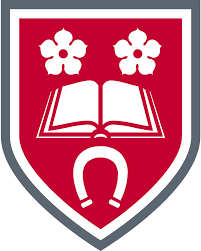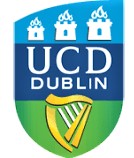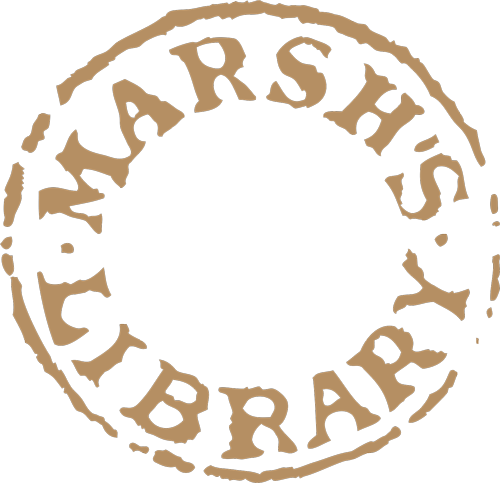
James Joyce
Apocalypse & Medievalismin Marsh’s Library
AN ONLINE EXHIBITION
A young man signed the register in 1902
James Joyce (1882–1941) was educated by the Jesuits at Clongowes Wood and Belvedere, before studying English and Italian in University College Dublin. He read in Marsh's Library on at least two consecutive days in October 1902.
Exhibit
Click images for more detail.
Marsh's Library in Joyce's Work
Marsh's Library appears in Stephen Hero, Ulysses and Finnegans Wake.
The most extensive reference to Marsh’s Library is in Stephen Hero. From this, it seems clear that Joyce was interested in writers of the Italian Trecento, as well as works about St Francis of Assisi.
Above all, Joyce was drawn to Marsh’s to read a number of books by, or attributed to, a medieval monk named Joachim of Fiore (also known as Joachim Abbas), who was associated in the popular mind with a radical form of religion which prophesied the end of the world.
Italian Books of the Trecento
In Stephen Hero, the protagonist went to Marsh’s Library ‘to read old Italian books of the Trecento’.[p. 167] The ‘Trecento’ is the name given to the literary and artistic culture which manifested in Italy during the 1300s. Joyce studied Italian at Belvedere and University College Dublin and would have been familiar with the literary masterpieces of the period.
There are numerous references to Dante and Boccaccio in Stephen Hero, A Portrait of the Artist and Ulysses. Marsh’s does not hold any original manuscripts relating to the great triumvirate of Trecento literature, but it does possess a number of sixteenth and seventeenth century printings of these works, and Joyce may have taken the opportunity to consult some of these rare and curious editions.
The Cult of St Francis
In Stephen Hero, Joyce writes that ‘[h]e had begun to be interested in Franciscan literature…’ Saint Francis of Assisi (d.1226) was the founder of the Franciscan Order, and was devoted to a life of prayer and service to the poor (earning the name il Poverello, ‘the poor man’). This strict adherence to a life of poverty was in sharp contrast to the wealth of the Papacy, and led to some tensions between the Franciscans and Rome. It also sheds some light on Joyce’s reference to Francis as the ‘mild heresiarch of Assisi’. A 'heresiarch' is the originator of a heretical doctrine, and here Joyce seems to be playing with differing concepts of Francis, either as mildly heretical or as a mild-mannered man whose teaching gave rise to heresy among some of his followers.

The Prophecies of Joachim Abbas
In Ulysses, Joyce makes reference to the ‘fading prophecies of Joachim Abbas’. Joachim (d. 1202) was a Cistercian, but his work had a profound influence upon a group of ‘spirituals’ within the Franciscan tradition, who viewed him as a prophet. Joachim’s works were condemned by Pope Alexander IV (d. 1261), and the Franciscan spirituals were sternly repressed.
Marsh’s holds five books by – or attributed to – Joachim of Fiore. These works – with their taint of heresy – would have been unavailable to Joyce in either the National Library of Ireland or in the library of University College Dublin. Even though Joyce was interested in the Franciscans, it seems clear that his primary concern in visiting Marsh's was to access the works of Joachim and his Joachimite followers among the Franciscans.

The Irish Franciscans
Joyce was drawn to the Franciscans because of an interest in Italian literature and culture of the Middle Ages. However, it seems that he was also struck by the Irish Franciscan exiles of the sixteenth and seventeenth centuries. Most of the works of these Irish Franciscans were in Latin, the international language of European scholarship, but their use of printing as Gaeilge (‘in Irish’) was important in the development of the vernacular tongue. Joyce evidently saw something of himself in the plight of Irish scholars who were forced to flee to the continent, and who, in doing so, set about constructing a new and compelling body of both learned and vernacular literature which shaped Irish culture and history.
The interplay of Irishness and the development of a powerful vernacular idiom in the seventeenth century had contemporary resonances for Joyce.








Essays on Joyce's Reading
The catalogue of the physical exhibition 'James Joyce: Apocalypse & Exile' included an introduction by the Director of Marsh's Library, Jason McElligott, and essays by the academic collaborators, Anne Marie D'Arcy (University of Leicester) and John McCafferty (University College Dublin) setting out the scholarship underlying the choice of items. The curator of the online version, Rachel Evans (University of Leicester), has added her reflections on an experience of Joycean Dublin.

Jason McElligott

Anne Marie D'Arcy

Anne Marie D'Arcy

Anne Marie D'Arcy

John McCafferty






















































